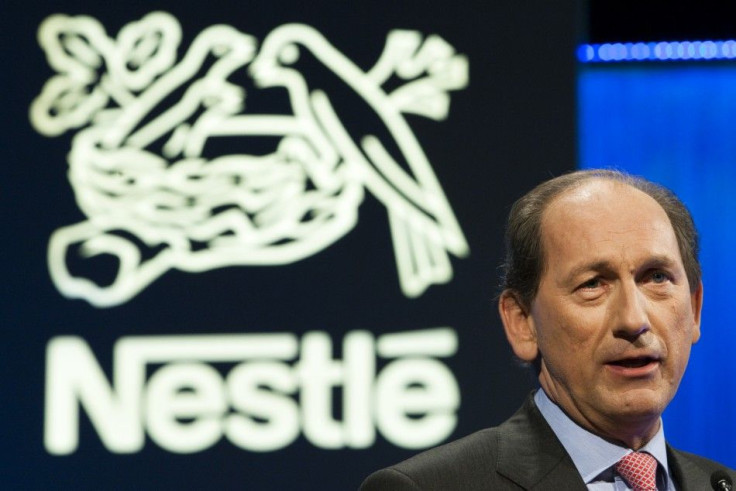Nestle Buys Pfizer's Baby Food Business For $11.9 Billion

ZURICH (Reuters) - Swiss food group Nestle is to buy drugmaker Pfizer's baby food business for $11.85 billion, beating out French rival Danone in the battle for dominance of fast-growing emerging markets.
The world's biggest food company had to dig deeper than expected into its ample pockets to win the high-stakes fight for Pfizer Nutrition, which makes 85 percent of its sales in emerging markets and is Nestle's biggest deal to date.
The price tag is high, however Nestle is securing a high growth/margin business with high exposure in the emerging markets. China will become the number 3 market for Nestle overall, said Vontobel analyst Jean-Philippe Bertschy.
Nestle said the deal would add to earnings per share from the first year, and would allow cost synergies of $160 million. Bertschy expects it to add about 0.5 percent to earnings per share in the first year and 1.5 percent in the following years.
Nestle shares, which hit an all-time high of 57.50 francs ahead of solid first-quarter results last week, fell 2.5 percent to 55.70 francs at 8:23 a.m. EDT (1223 GMT), compared with a 1.4 percent weaker European food and beverage index. The shares were trading ex-dividend, but were down less than the 1.95 francs payout.
Although the growth profile, attractive margins and emerging market exposure makes this a compelling asset, we believe that the multiples being some way ahead of market expectations may dampen near term enthusiasm for the deal, said Citi analyst Robert Dickinson.
The deal price was well above the $10 billion which had been expected. Nestle said it was paying 19.8 times expected 2012 core earnings, above previous Nestle deals in the sector when it paid 15.7 times for Gerber and 17.6 times for Novartis Nutrition, according to Citi.
Danone shares rose 1.5 percent to 53.22 euros as investors expressed relief that the French group would not have to leverage up its balance sheet to pay a big price for Pfizer.
CHINESE MARKET KEY
The Pfizer unit is a high-growth business built on its top SMA Gold brand, which ranks number five globally in the infant milk formula market - the world's fastest-growing packaged food category - after Nestle, Mead Johnson, Danone and Abbott Laboratories, with a quarter of sale in China.
Nestle said the Pfizer business should boost its margins and it forecast its sales at $2.4 billion this year, bringing revenue from the combined business to above $7 billion.
Chief Executive Paul Bulcke said it was premature to comment on regulatory issues, but analysts have speculated Nestle might have to sell 25 percent of the Pfizer unit by disposing of interests in Latin America, southeast Asia, Australia and South Africa, which could be bought by Danone or Heinz.
Chief Financial Officer Wan Ling Martello said the deal, to be paid for by a combination of cash and debt, could close at best in six months but it could take up to a year.
Kurt Schmidt, head of Nestle Nutrition and former chief executive of the U.S. baby food group Gerber that Nestle bought in a $5.5 billion deal in 2007, said the $30 billion global infant nutrition market was growing 10 percent annually.
Emerging markets make up 73 percent of that, growing at 13 percent a year due to increasing births and affluence there.
The $6 billion Chinese market is key as it is set to double to $12 billion by 2016 to feed 16 million new births a year. Mead leads the Chinese market followed by Danone. Pfizer is fifth with an 8 percent share, while Nestle has just 4 percent.
Nestle's roots go back to the 1860s development by Henri Nestle, a pharmacist, of the first infant formula for babies whose mothers who could not breast feed.
Nestle, which expects emerging markets to account for half of total sales by 2020 from 41 percent last year, has been an active player in recent emerging markets merger activity, taking stakes in two Chinese food companies.
Pfizer, which put its infant nutrition and animal health businesses up for sale last year to focus on its core pharmaceuticals business, said it would use the proceeds for share buybacks or to invest in other development opportunities.
We still see Pfizer potentially using the proceeds for larger acquisitions such as Bristol-Myers and the Abbott Pharma spin-off, said Jefferies analysts in a note.
And analysts at healthcare investment bank Leerink Swann said Pfizer investors were likely to cheer the high sale price, although the benefits from the sale of the fast-growing unit and a possible increased share buyback could reduce over time.
(Additional reporting by Catherine Bosley in Zurich and David Jones in London; Editing by Hans-Juergen Peters)
© Copyright Thomson Reuters {{Year}}. All rights reserved.






















